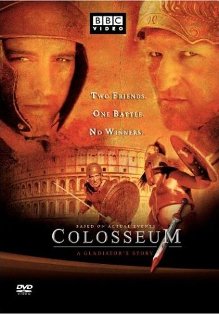Colosseum: Rome's Arena of Death
| Colosseum: Rome's Arena of Death | |
|---|---|

BBC DVD Cover
|
|
| Genre | Documentary |
| Written by | Tilman Remme |
| Directed by | Tilman Remme |
| Starring | |
| Voices of | |
| Narrated by | |
| Composer(s) | Ilan Eshkeri |
| Country of origin | United Kingdom |
| Original language(s) | English |
| Production | |
| Executive producer(s) | |
| Producer(s) | Tilman Remme |
| Cinematography | Peter Greenhalgh |
| Editor(s) | Malcolm Daniel |
| Running time | 50.44 minutes |
| Distributor | BBC Worldwide |
| Release | |
| Original network | BBC One |
| Original release | 13 October 2003 |
| Chronology | |
| Related shows | |
Colosseum: Rome's Arena of Death aka Colosseum: A Gladiator's Story is a 2003 BBC Television docudrama which tells the true story of Verus a gladiator who fought at the Colosseum in Rome.
The opening scene in A.D. 80 shows preparations for gladiatorial battle in the Flavian Amphitheater with Verus walking out toward the arena, as a voice-over narrator states that the contest of Verus in the Colosseum is the only one recorded in detail. Details of gladiator life are contained in documents from that period. This is Verus' story.
Flashback to 79, when Roman forces took a village in Moesia, and Verus with others is marched 50 miles to work in a quarry the slaves call "the pit", preparing stone for building an amphitheater the Emperor Vespasian intends to use for gaining popular support from the people. An owner ("Lanista") of a gladiatorial school arrives with his trainer to choose recruits, but when Verus is not chosen he sees an opportunity and assaults a fellow slave he does not know, Priscus. Their fight is broken up and they are both taken with the others to Rome and trained, and Verus and Priscus become friends.
All new gladiators fight in small arenas scattered around Rome, and when Verus is defeated, he requests a second chance, knowing he will not be given another, and defeats his opponent. Contrary to popular myth, not all contests end in death. If a gladiator was killed the game's sponsor had to pay for his replacement. As a gladiator, you had a near 90% chance of surviving the fight. And if a gladiator was injured, he was given some of the best medical care available in Rome. Roman doctors were renowned for their treatment of flesh wounds. Doctors who worked with gladiators helped to pioneer the treatment of fractures. And they used an opium-based anesthetic for operations. For each victory in the arena, a gladiator is paid the equivalent of a Roman soldier's yearly pay, and he can purchase some personal items. Priscus obtains a small prayer statue and wall-shelf for his own Celtic devotions.
Proper burial was very important to the Romans, and gladiators frequently formed "funeral clubs" to ensure that they would receive a proper burial if they died. When a fellow gladiator dies, during the funeral procession to the cemetery, the narrator says that gladiator burial stones are inscribed with their names, origins, fights and death. Verus and Priscus promise widow their support.
...
Wikipedia
